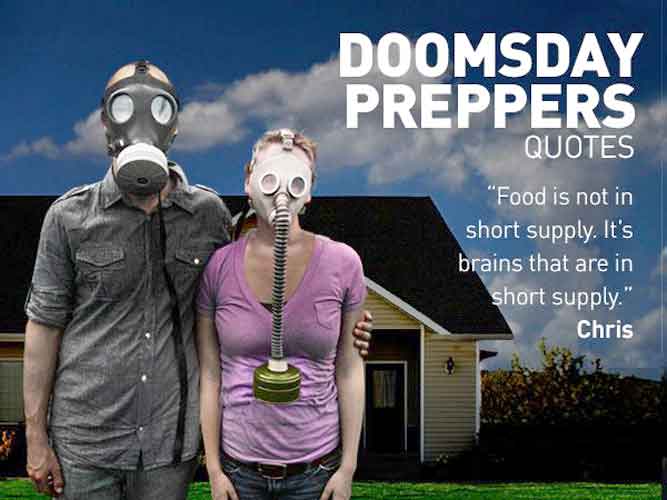They run websites, there’s a limited TV series profiling them, they are the targets of survival-gear advertising campaigns, and, for some critics, they are the objects of substantial ridicule.
They’re “preppers,” and they appear to be here to stay.
While they are not all pessimists, and most fall well short of being full-fledged “survivalists,” who are a different breed of cat altogether, preppers think that even if things appear to be bad now, they could still get worse. Much worse.
So they want to be prepared (hence “prepper”) if and when society’s meadow muffins adversely impact its rotary air-circulation device. Prepper websites run down a lengthy list of potential negative events that could lead to short- or long-term social breakdown.
Those events could throw people back on their own resources for a brief period of time (think Hurricane Katrina) or, as the scale of disaster escalates, for weeks or even months (in case of huge earthquakes affecting major population areas or terrorist attacks using weapons of mass destruction).
For preppers, those photos of school buses that could (and should) have been used to evacuate New Orleans residents, but were left by city officials to be covered with water, show you can’t depend on government at any level to pull your bacon out of the fire.
The videos of tsunamis covering resorts in Indonesia and whole cities in Japan also contribute to their sense of vulnerability.
No one can contemplate the idea of a dirty bomb going off on Wall Street — or whole cities being devastated by a nuclear bomb smuggled from Iran or North Korea, or a terrorist-spread anthrax or smallpox epidemic, or even a small-asteroid impact — without understanding that food trucks might not arrive regularly for some period of time.
Fuel and other necessities, including clean drinking water, also could be hard to come by.
Which may be why the National Geographic Channel is running a six-part series, which concludes this coming Tuesday, with episodes titled “Bullets, Lots of Bullets,” “Back to the Stone Age” and “Nine Meals from Anarchy.”
These prepper profiles are about people who have internalized the Boy Scout motto, “Be Prepared,” in case things get tough for a few days, to people who anticipate a total social breakdown that could take months or years to overcome.
You can generally tell them apart by how many guns and crates of ammunition they are stockpiling (firearm sales have been soaring nationally for years).
Critics of the movement point out that if a real crisis occurs, having gone on TV to tell how prepared you are for it simply means you’ve volunteered to become a target for the hungry mobs you think will be roaming the countryside afterwards.
Second, while it makes sense to keep some canned or freeze-dried food and bottled water on hand for localized disasters such as storms, floods or earthquakes, a huge breakdown of food and fuel networks lasting for months, while not impossible, remains highly unlikely.
People would organize quickly to take care of each other, guided by the parts of society that have experience in such things, such as disaster preparedness officials, public safety departments and the National Guard, along with active-duty military forces.
And in spite of what you see on TV, zombie attacks are probably not part of the picture under any circumstances.
So, there are degrees of concern that range from the probable to the possible to the wildly ridiculous. Keeping firearms for self-defense is fine, if you know weapons and practice with them, but they are not a panacea for every potential peril.
We can’t ignore the fact that the prepper movement is so mainstream, however, that even one state government takes it seriously.
The Wyoming Legislature has given preliminary approval to a bill that would create a state-level task force to come up with ideas for how the state should be ready to react to a widespread (even nationwide) social or political breakdown.
And USA Today this week cited a number of economists who say that the national outlook is way beyond gloomy. An article headlined, “Three doomsaying experts who foresee economic devastation ahead,” quotes one of them, Gerald Celente of the Trends Research Institute, as saying Americans face “an economic 9/11.”
His advice, the paper says, “centers on survival. He says buy gold so you don’t lose purchasing power when the value of the dollar plummets. He says buy a gun to protect your family against desperate people in search of food and money. He says plan a getaway to places with more stable finances and governments.”
In short, he’s a prepper. They’re everywhere these days.
CORRECTION
On Feb. 25, this column listed an incorrect website for the group seeking a Choose Life license plate in Maine. The correct site is www.MEChoose-Life.org.
M.D. Harmon is a retired journalist and a freelance writer. Email at mdharmoncol@yahoo.com
Copy the Story LinkSend questions/comments to the editors.



Success. Please wait for the page to reload. If the page does not reload within 5 seconds, please refresh the page.
Enter your email and password to access comments.
Hi, to comment on stories you must . This profile is in addition to your subscription and website login.
Already have a commenting profile? .
Invalid username/password.
Please check your email to confirm and complete your registration.
Only subscribers are eligible to post comments. Please subscribe or login first for digital access. Here’s why.
Use the form below to reset your password. When you've submitted your account email, we will send an email with a reset code.